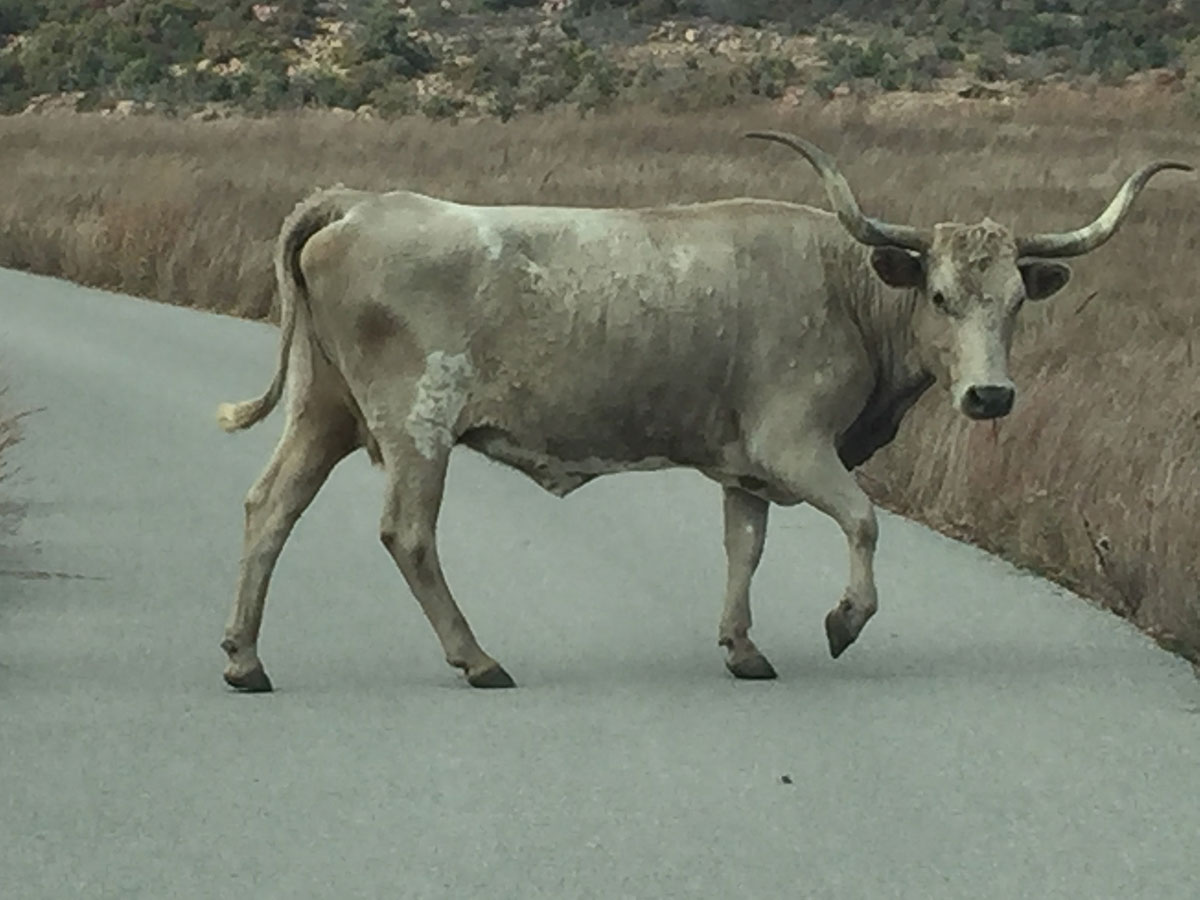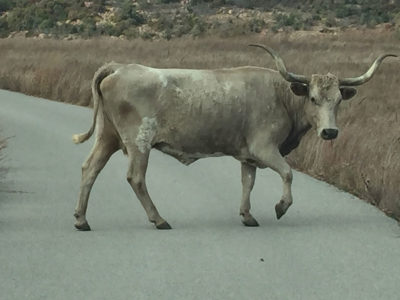
Roaming Livestock and Texas Highways
On a dark winter night on December 2015, Joshua Garcia was driving his pick-up truck on State Highway 123 in Wilson County when he collided with a 2,000-pound bull that had wandered onto the road after escaping a nearby fenced pasture. The wayward bull was killed, Joshua was injured, and his truck was totaled. Joshua sued the bull’s owner Shary Pruski, but the trial court granted summary judgment for the owner.
On appeal to the Fourth Court of Appeals (the 32-county appellate court that sits in San Antonio), the parties told the court the case was udderly a no-brainer because the applicable law was clear and adequately briefed (which parties sometimes do to appear bullish about their positions to the appellate court). But the court of appeals did not find the case quite so simple, and reversed in part and affirmed in part, herding the parties back to the trial court for further proceedings.
Pruski sought review in the Texas Supreme Court, and made it through the narrow chute of high court review. (Only about 10% of petitions for review are granted by the High Nine.) The court will hear oral argument on November 7.
So, what’s the beef? Texas, like a few other states, does not recognize a general common-law duty to keep cows and other livestock from wandering around. As the Texas Supreme Court wrote in 1893:
“Neither the courts nor the legislature … have ever recognized the rule of the common law of England which requires every man to restrain his cattle either by tethering or by inclosure …. It is the right of every owner of domestic animals in this state, not known to be diseased, vicious, or ‘breachy,’ to allow them to run at large …. Clarendon Land Investment Agency v. McClelland Bros., 23 S.W. 576, 578 (Tex. 1893).
Over the years, the Texas Legislature has encroached on the common law rule of no liability for wandering livestock, to adjust to changing times. Among other things, the momentous invention of barbed wire in the 1870s, and President Dwight Eisenhower’s signing of the 1956 act which authorized construction of 41,000 miles of interstate highways, prompted the legislature to try to protect roadways from wandering livestock, and to expand the rights of local jurisdictions to constrain the ability of livestock to hoof it anywhere they want to go.
Today, most of the statutes regulating livestock and fencing are located in Chapter 143 of the Texas Agriculture Code. Here are the two key parts of Chapter 143 at issue in Garcia v. Pruski:
- Roaming on the Highway (Subchapter E). A person who owns or controls a “horse, mule, donkey, cow, bull, steer, hog, sheep, or goat may not knowingly permit the animal to traverse or roam at large, unattended on the right-of-way [ROW] of a highway.” A “highway” is a U.S. or state highway, but not including numbered farm-to-market roads. (An exception is provided for using a right-of-way to herd livestock from one point to another.) Violation of statute is a misdemeanor, and every day of violation is a separate crime. §§ 143.101-.104, 143.108.
- Local Stock Law – Running at Large (Subchapter D). Based on a law originally passed in 1876, a county or portion thereof can hold an election and adopt a “local stock law” the prohibits “horses, mules, jacks, jennets, donkeys, hogs, sheep, or goats” from “run[ing] at large in the county or area.” §§ 143.021-.034. An election can also be held to determine whether “cattle are to be permitted to run at large in the county or area.” (However, 22 counties are excluded from voting to prohibit cattle from running at large, including Schleicher County in the Hill Country.) It is a misdemeanor to allow a head of cattle to run at large where prohibited by a local stock law. §§ 143.071-.082.
The court of appeals held that Pruski was on the hook to fulfill his statutory duty under the Roaming on a Highway statute to not knowingly allow his bull to wander unaccompanied on SH 123.
[Digging deeper: Garcia did not argue in the court of appeals that the bull’s owner had a common law duty to keep the animal from escaping its enclosure and wandering onto the highway. Given the legislation outlined above, it is doubtful the supreme court would consider creating such a duty for the first time. Common law is law created by courts rather than the legislature (yes, courts make law; that familiar judicial campaign slogan “I will not make the law, only call balls and strikes” is inane—don’t get me started on that). Texas adopted the common law of England at the outset of the Texas Republic in 1840, so the courts sometimes have to decide whether to follow or reject the common law of England. See, e.g., Houston & T.C. Ry. Co. v East, 81 S.W. 279 (Tex. 1904) (adopting the English “rule of capture” that generally allows a person to pump and use groundwater without being liable to neighbors for depletion of the water supply); see also Sipriano v. Great Spring Waters of America, 1 S.W.3d 75 (Tex. 1999) (declining to overrule East, but warning legislature to get its act together on regulating the overpumping of groundwater).]
The meatier issue was whether the bull’s owner also owed a duty under the Local Stock Law adopted in Wilson County that prohibits persons from allowing livestock to run at large within the county. How does the Local Stock Law interact with the Roaming on a Highway statute? The latter only applies to a knowing violation; the former is not limited to knowing violations (although the criminal violation does require a knowing violation).
The court of appeals held that there was no conflict between the two subchapters of Chapter 143. The two schemes operate independently. Pruski had the legal duty to comply with both subchapters. The fact that the bull caused an accident on the highway did not relieve the bull’s owner from his obligations under the Local Stock Law.
The court next addressed whether there was any evidence that Pruski had violated these statutory duties. The bull had been kept in a 37-acre pasture enclosed by a six-strand barbed-wire fence. The property was about 30 feet from the highway. There was no cattle guard. And eight years prior, another head of cattle belonging to Pruski had escaped the enclosure and was killed by a vehicle on the highway. The gate was normally locked, but there was evidence that on the day of the accident the gate was not locked and was secured only with a latch. The bull broke the latch to make his escape, apparently, but nobody knew for sure how the bovine eloped.
So does “knowingly” in the Roaming on a Highway Statute mean “knew or should have known” so as to support a negligence claim? The term “knowingly” is not defined the statute. After pulling Black’s Law Dictionary off the shelf to see what the hornbook law is, the court of appeals held that “knowingly” requires the owner to be consciously aware of the roaming of the livestock. Evidence that the owner “should have known” is not enough; thus, a claim of negligence is not available in this context. (Would recklessness or gross negligence be enough to amount to “knowingly”? The case does not present this issue.) The trial court properly granted summary judgment for the bull’s owner under the Roaming on a Highway Statute.
But the Local Stock Law that prohibits persons from allowing cattle and other types of livestock to run at large does not require a showing that a violation was committed knowingly. The evidence provided by Garcia in response to the owner’s motion for summary judgment—including the fact that the owner failed to lock the gate despite knowing there was chance the bull might break the lock and escape, which had happened before—was sufficient to raise a genuine fact issue for trial as to whether the owner was negligent.
The Texas Supreme Court will decide whether the court of appeals’ interpretation of these laws was correct. Cattle ranchers, represented by the Southwestern Cattle Raisers Association, filed an amicus letter trying to steer the court in favor of Pruski. The group argued that livestock owners should not be saddled with liability for mere negligence when roaming livestock causes injuries on the highways of Texas. They agree with Pruski that the higher level of culpability required by the Roaming on a Highway Statute, when that law applies, should supersede the Local Stock Law. They see the court of appeals decision as the horns of an intractable dilemma.
The practical considerations at steak here are: how careful do owners of livestock have to be in counties that have adopted the Local Stock Law, and how much insurance do they need to buy in case Hereford Houdini flies the coop? As in a few other areas of life, good fences and secure gates can avoid many problems.
The supreme court will give us its verdict in a few months. [SBR]



